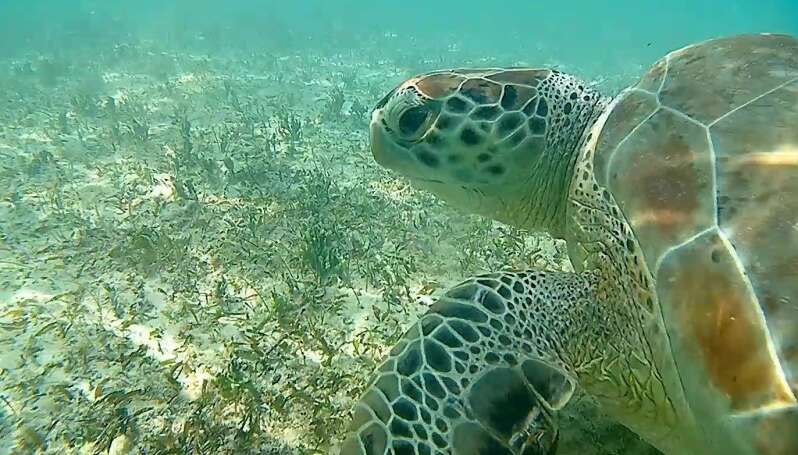Recent News
Seal Named “Northlands”, Set To Leave IslandMonday, March 20, 2023
The seal who was found on Clearwater Beach last month has officially been named Northlands — with Ruby Dill naming the seal after her granddaughter’s school — and Northlands will soon be traveling to the USA with the aim he continue his rehabilitation before being released back into the wild.
Plans Being Made To Send Seal To The USA
Saturday, March 18, 2023
The seal that was found in Bermuda last month — which is only a few weeks old — is “eating six pounds of fish a day, gaining weight, and generally doing well,” and plans are being made to send him to the Mystic Aquarium in Connecticut, with the same facility that accepted the seal that was found here in 2019, set to assist again.
BZS Trunk Island Cottage Receives Upgrade!
Friday, March 17, 2023
Thanks to the unwavering support of our donors, the Bermuda Zoological Society (BZS) has recently completed renovations to the cottage on Trunk Island – the BZS Living Classroom, the jewel in the crown of BZS education. The renovations have expanded the footprint of the current island classroom to encompass an expansion of the sheltered porches for outdoor learning while also providing storage areas for teaching tools.
Over 500 People Attend Lionfish Chowder Event
Friday, February 24, 2023
Chiko&T’s Restaurant won both the People’s Choice and Judge’s Awards at the BZS Lionfish Chowder competition, while The Cloud at the Waterfront, Wahoo’s Bistro, the Loren and the Spot Restaurant claimed second and third place honours.
HSBC Announced as Lead Sponsor of BZS Micro Forest Project
Monday, February 20, 2023
With the impacts of climate change being felt more and more each year, the need for reforestation projects has arguably never been more important and urgent. The Bermuda Zoological Society (BZS) today announced that HSBC has thrown its weight behind increasing Bermuda’s biodiversity, as Lead Sponsor of the BZS Micro Forest Project – Bermuda's Official Micro Forest Initiative.
About
GovernanceAbout Us
Newsletter
Latest News
Gift & Bookstore
Contact
General Inquiries
info@bzs.bm
Latest News
All the latest updates and news from the Bermuda Aquarium, Museum, and Zoo, one of Bermuda's leading visitor attractions!

Many acres of seagrass beds crucial for the survival of sea turtles and other marine life have “completely collapsed” over the last four years, according to a leading environmental group.
The Bermuda Turtle Project says “immediate changes” are needed to save the remaining seagrass beds and to help new ones to grow.
While praising the conservation and research efforts already being carried out by the Department of Environment and Natural Resources to protect seagrass habitats, Jennifer Gray, director of the Turtle Project, said more needs to be done in an opinion piece which appears on the Opinion section of The Royal Gazette today.
Ms Gray said the Bermuda Turtle Project (BTP) is resuming its in-water research this week after a 24-month absence caused by the Covid-19 pandemic, but added it is already clear from observations “there have been some drastic changes in our marine environment”.
She said: “Once thriving seagrass beds have been in decline for some two decades, but over the last 48 months many acres of this critical habitat have completely collapsed with not a blade of grass left.
“Along with the disappearance of seagrass comes numerous consequences comprising disturbance and shifting of the marine sediments that were once held stable by the root systems of the seagrass and a vulnerability to the arrival of potentially invasive species, especially algae.
“Even more troubling is the seeming departure of once-visible species like fish and sea turtles. BTP has been documenting a change in the size class of green turtles on the Bermuda platform that shows green turtles departing our shores at a smaller size than they once did.”
Ms Gray said it is likely that some sea turtles are still living around Bermuda and may have changed habitats.
“We need to get out there and conduct our research to obtain a clearer picture of what is happening,” said Ms Gray.
“We know there are still turtles here, and that they appear to be utilising new habitats around the island. There have been observations of small green turtles feeding on algae and even mangrove leaves, perhaps making a diet change rather than risking a migration. Further studies are essential and will help fill in the blanks on what, exactly, is happening with sea turtles in Bermuda.”
She said research is also needed on other causes of seagrass decline including seagrass pathogens and disease, some of which have wiped out similar habitats on the US coastlines and could have easily arrived in Bermuda.
In the meantime, she said other immediate steps can be taken to arrest the decline in the seagrass and sea turtle and fish populations.
These include protecting sharks and other natural predators in order to return to a more natural balance in the food web and ecosystem and Introducing marine protected areas (MPAs) where harmful fishing practices, anchoring, engine outputs and propeller scarring are eliminated.
“This would afford a better chance for seagrass recovery and the return of juvenile fish which, when they multiply, would spill outside the protected area, providing an increase in abundance in areas where fishing does take place.”


